Emergent literacy is a key focus in any effective preschool curriculum, marking the exciting stage when children start to understand the fundamentals of literacy and language. This early phase includes the development of several critical skills that can have a life-long impact.
In this blog post, we will discuss what emergent literacy means, identify the essential skills involved, and suggest ways to encourage emergent literacy in early childhood education.
Our goal is to equip you with practical insights and tools to foster an enduring love for reading and writing in young learners.
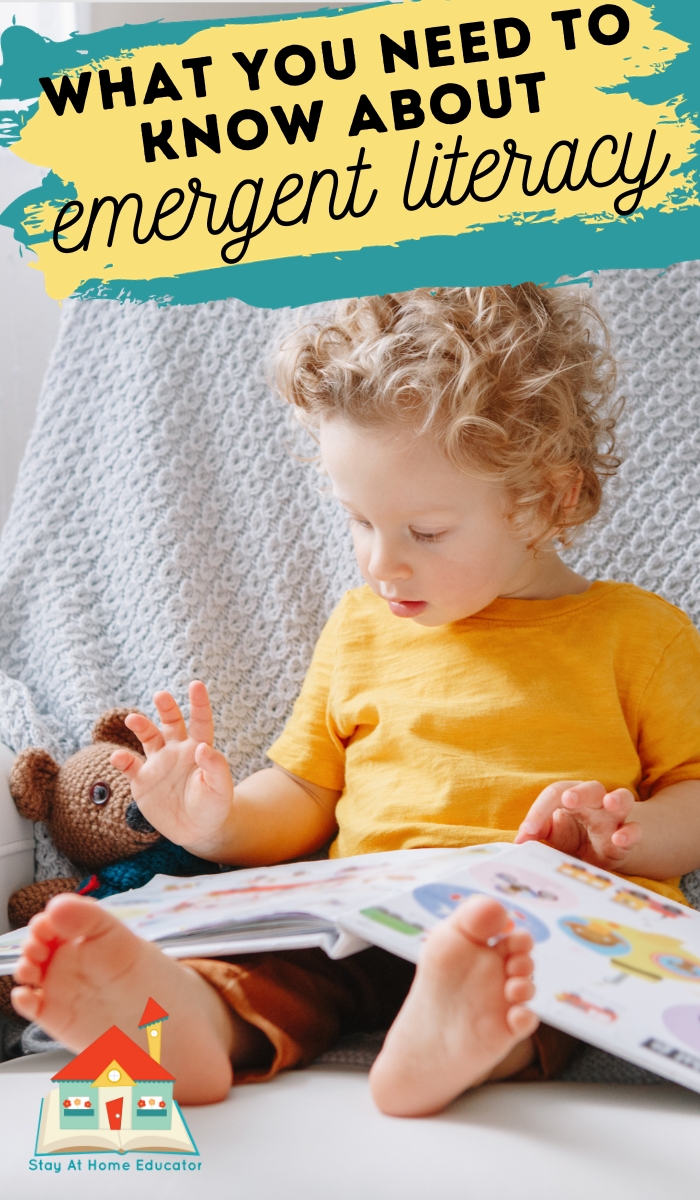
This post may contain affiliate links, which means that at no cost to you, I may earn a small sum if you click through and make a purchase.
Emergent literacy is an essential part of any strong preschool literacy curriculum, marking an important time when kids begin to learn the basics of reading and writing.
This early stage involves developing key skills in literacy components like phonological awareness, oral language development, and alphabet skills.
We’ll explain what emergent literacy is, point out the important skills it includes, and suggest ways to help these skills grow in early childhood education.
This post will equip you with valuable insights and resources that aid in fostering a sustained enthusiasm for reading and writing among young learners.
-
Product on sale
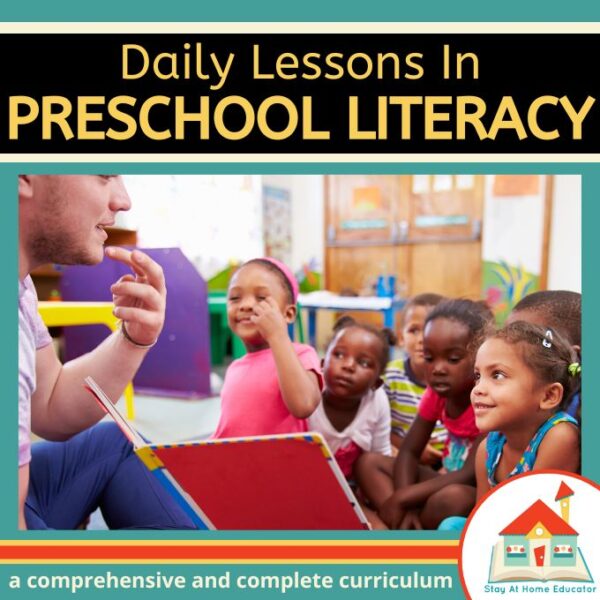 * Daily Lessons in Preschool Literacy CurriculumOriginal price was: $135.00.$99.00Current price is: $99.00.
* Daily Lessons in Preschool Literacy CurriculumOriginal price was: $135.00.$99.00Current price is: $99.00.
What is Emergent Literacy?
Emergent literacy refers to the process of building literacy skills from a young age, even before the commencement of formal education.
This concept includes listening, speaking, reading, and writing as integral parts of early childhood learning.
Emergent literacy involves children acquiring these skills through interaction and engagement with their surroundings. It also emphasizes their responses to reading and writing tasks.
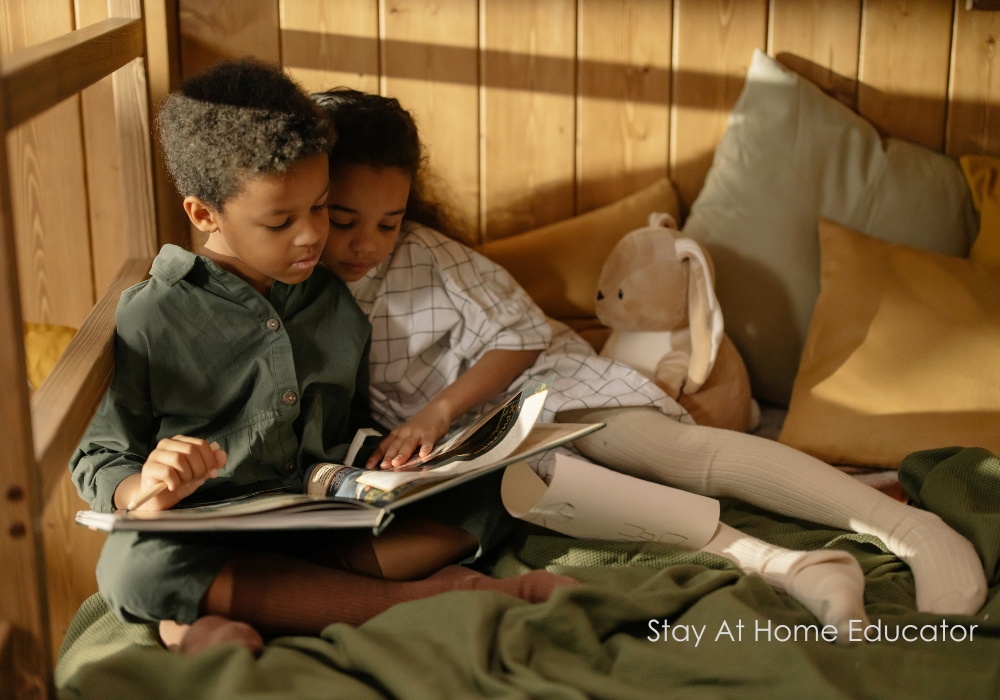
Since emergent literacy initiates from birth, children attain new abilities and achieve developmental milestones at varying stages. Activities such as reciting nursery rhymes, reading aloud, exposing them to music, and singing can significantly enhance their reading and writing capabilities.
Consequently, children who regularly engage in these activities tend to develop larger vocabularies, become proficient readers, and excel academically. As an educator, you can facilitate intentional learning experiences to further enhance their reading skills.
Why is Emergent Literacy Important?
Emergent literacy is crucial because it forms the foundation for reading and writing skills, which are essential for academic success and daily life. It begins at birth and develops through experiences with spoken and written language.
- Emergent literacy helps children understand the relationship between sounds and letters, laying the groundwork for phonetic awareness, a critical skill for learning to read.
- It builds vocabulary.
- As children listen to stories or engage in conversations, they learn new words, which helps them understand and express complex ideas.
- Emergent literacy fosters an understanding of narrative structure and comprehension, allowing children to follow storylines and understand information presented in books or spoken language.
- It encourages a positive attitude towards reading and writing.
- By engaging with books and other written materials from an early age, children can develop a love for reading, which can motivate them to become lifelong learners.
Therefore, focusing on emergent literacy in early childhood education can significantly impact a child’s future academic achievements and overall language development.

Development of Emergent Literacy and Writing
Children start forming notions about print from a tender age, sometimes as early as infancy, when they start associating words with their meanings.
By seizing opportunities to teach emergent literacy skills, parents and caregivers can cultivate a lifelong passion for reading in their children. It’s important to note that some of these teaching ideas can be applied interchangeably across various age groups.
Early Literacy Tips for Babies
- Begin reading to your child at a very young age.
- Children love books that have brightly colored pictures, rhyming, and that relate to their own experiences.
- Repeat your child’s babbling and add to them.
- Talk to your child during daily routines around the house. Explain what you are doing.
- Reread your child’s favorite books.
Literacy Skills for Toddlers
While some toddlers might start learning letter names and sounds, the following skills are a prerequisite for learning to read with ease. Here are some toddler literacy skills that should be focused on first.
- Language Acquisition
- Learning and using new words during playtime or everyday conversations.
- Print Awareness
- Recognizing letters and understanding that print carries a message.
- Listening Skills
- Paying attention to spoken language, following simple instructions, and listening to stories.
- Pre-Writing Skills
- Scribbling, drawing, and attempting to write letters or their own name.
- Book Handling Skills
- Knowing how to hold a book, turn pages, and start at the beginning of a story.
- Interest in Reading and Books
- Showing enthusiasm for reading and choosing to look at books independently.
For a full breakdown about what early literacy skills are developmentally appropriate for toddlers, read this post about how to assess literacy skills.
Toddler Literacy Activities
- Talk, sing and play with your child. Do finger plays.
- Ask your young toddler to name objects and people.
- Point out words on signs and logos on food boxes and games. Click here for my post about environmental print.
- Introduce new vocabulary words during holidays and family celebrations.
- Give simple definitions to new vocabulary in books, then encourage your child to use that new vocabulary.
-
Product on sale
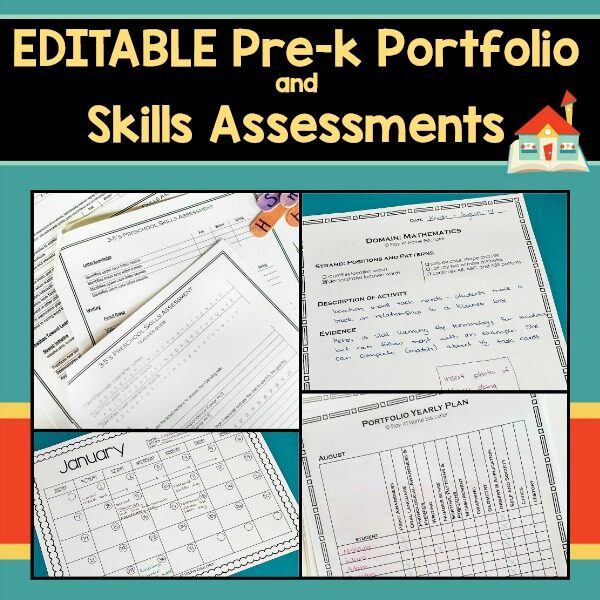 EDITABLE! Preschool and Toddler Portfolio and Skills AssessmentsOriginal price was: $12.00.$6.00Current price is: $6.00.
EDITABLE! Preschool and Toddler Portfolio and Skills AssessmentsOriginal price was: $12.00.$6.00Current price is: $6.00.
Emergent Reading Skills in Preschool
Emergent literacy refers to the skills and knowledge that are developmental precursors to reading and writing. For preschoolers, this period is a critical time for language development, vocabulary building, and exposure to print.
Here is a list of key emergent literacy skills that preschool children typically develop:
- Print Motivation
- This is an interest in and enjoyment of books. Preschoolers should be encouraged to explore books and develop a curiosity for reading.
- Print Awareness
- This involves recognizing print and understanding its uses. Children at this age begin to learn that print carries a message, whether it’s in a book, on a sign, or on packaging.
- Vocabulary
- Vocabulary development is crucial at this stage. By being exposed to a wide range of words, children can begin to communicate more effectively and understand more of what they read.
- Narrative Skills
- This includes the ability to describe things and events, and to tell or retell a story. This skill is important for understanding and remembering what is read.
- Letter Knowledge
- Recognizing and naming letters is a fundamental step towards learning to read. Preschoolers often start by recognizing the letters in their own name.
- Phonological Awareness
- This is the ability to hear and manipulate the sounds in spoken language. This includes recognizing rhymes and beginning to associate sounds with certain letters.
- Writing and Drawing
- As preschoolers develop fine motor skills, they begin to draw and write. Scribbling and drawing are early forms of writing, and these activities help children understand that written symbols carry meaning.
These emergent literacy skills are interrelated, and together, they provide the foundation for learning to read and write. Encouraging these skills in preschool children can foster a love of reading and set them up for success in school.
Understanding and nurturing early literacy skills in preschoolers are crucial for their cognitive development. Here’s a comprehensive guide on how to assess letter recognition and other pre-reading skills.

Emergent Literacy Activities for Preschoolers
It’s easy to encourage and support early literacy in your day-to-day activities. Here are some simple, no prep, do-on-a-whim emergent literacy activities for preschoolers.
- Read Together Daily
- Make reading a part of your daily routine, such as before bedtime or after meals.
- Interactive Reading
- Ask questions about the story or pictures to engage your child and boost their comprehension skills.
- Alphabet Practice
- Use toys, flashcards, or apps to make learning the alphabet fun and interactive.
- Storytelling Sessions
- Encourage your child to tell their own stories to foster creativity and enhance narrative skills.
- Rhyme and Sing
- Nursery rhymes and songs can help your child develop phonological awareness.
- Visit Your Local Library
- Regular visits can help children associate libraries with the joy of discovering new books.
- Practice Writing
- Provide opportunities for your child to scribble, draw, and practice writing letters and their name.
- Encourage Print Awareness
- Show your child how you use reading in daily life, such as reading recipes, shopping lists, or road signs.
-
Product on sale
 * Daily Lessons in Preschool Literacy CurriculumOriginal price was: $135.00.$99.00Current price is: $99.00.
* Daily Lessons in Preschool Literacy CurriculumOriginal price was: $135.00.$99.00Current price is: $99.00.

I’m Sarah, an educator turned stay-at-home-mama of five! I’m the owner and creator of Stay At Home Educator, a website about intentional teaching and purposeful learning in the early childhood years. I’ve taught a range of levels, from preschool to college and a little bit of everything in between. Right now my focus is teaching my children and running a preschool from my home. Credentials include: Bachelors in Art, Masters in Curriculum and Instruction.


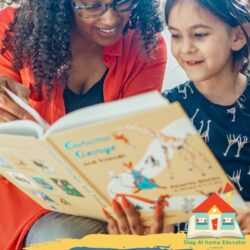


Great ideas. I think the more fun it is the more they want to take part.
Thanks for linking to the Sunday showcase.
Great tips. I like how you list other resources at the end as well. Thanks for sharing at Mom’s Library!
Thank you, these tips are very helpful…I’m about to need them!
My mother was a teacher – specifically a reading teacher for 1st graders and a teacher for older students that were very behind in reading. When I read through this post, I recognize things she did with me when I was a child and that I find myself doing with my own children without even thinking about it. I must have also seen her model these things with other babies, toddlers and preschoolers that she cared for at our church growing up – with me always “helping.” I think these tips for early literacy/reading are so important. My brother and I are both avid readers who always loved learning. I credit my mother and these education practices.
Love it! So many helpful tips to help kids get started on the right foot! Thanks for linking up to TGIF! Have a great weekend,
Beth =-)
This was a great article. I have a 1 year old, a 3 year old, and a kindergarten child so we cover this whole range. 🙂
Thanks for the tips! I have a preschooler and a toddler at the moment and I’m always trying to find ways to get more literacy activities in. These sound so easy!
These are great tips! My kids (when just learning to read) love reading signs wherever we go. It has become a game. We also play the alphabet game on long trips. They look at signs and have to find each letter of the alphabet in order.
Thanks for sharing with my Super Link Party! 🙂
What a fantasitc article! Thanks for the link!